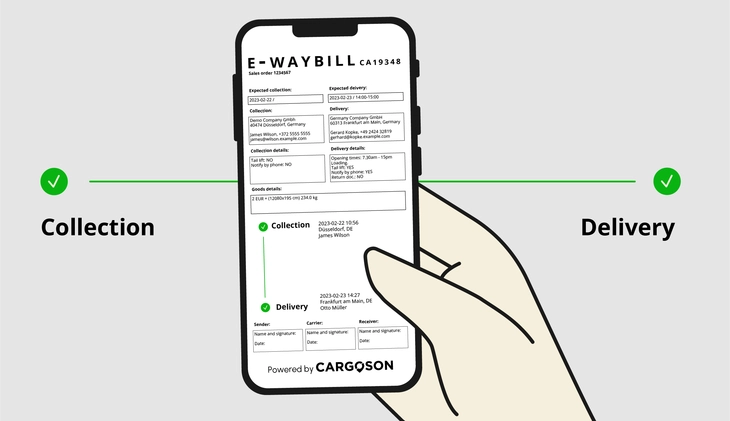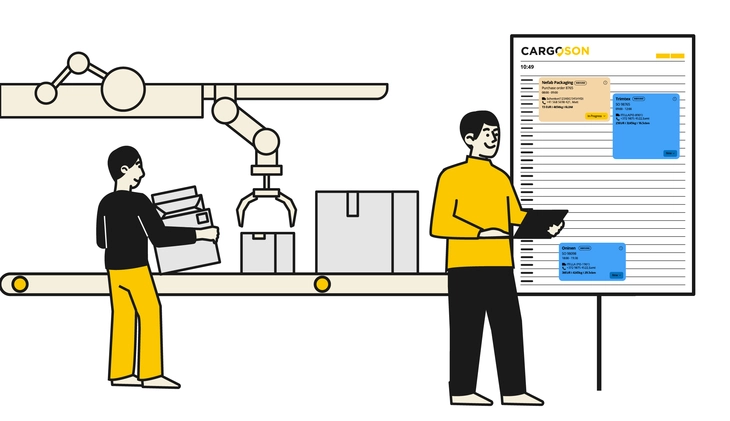When transporting goods, it is important to know the rights and obligations of the buyer, seller and transport company, so that the circumstances of the transaction are common to all parties and no unpleasant surprises are expected. Let's explain here:
- what incoterms are,
- what rights and obligations they regulate more precisely, and
- how to choose the right term.
In the end of this article, you can also download a free Incoterms 2025 chart PDF. This includes a table with all the latest incoterms, their explanations and who is responsible for what. See also: incoterms calculator.
Delivery clauses or delivery terms or Incoterms (Incoterms 2025)
Simply put, delivery terms (Incoterms) are a standard set of rules that determine the rights and obligations of the parties to a contract for the purchase or sale of goods. A set of trade rules developed by the International Chamber of Commerce to help simplify purchase and sale transactions by providing standard solutions for delivery costs, risks and responsibilities. This set of trade rules was published in 1936 and consists of 11 rules that define who is responsible for what in international transactions - EXW, FCA, FAS, FOB, CFR, CIF, CPT, CIP, DPU, DAP, DDP. Only one of them will be implemented for each specific contract. Delivery clauses are known and recognized all over the world. They are mandatory on every invoice and reduce the possibility of costly misunderstandings.
Delivery clauses are divided into two:
- EXW, FCA, DPU, DAP, CPT, CIP, DDP are used for all modes of transport (sea, road, rail and air);
- FAS, FOB, CFR, CIF are used for maritime transport only.
There are 11 incoterms in 2025. Let's now explore them further.
Delivery terms for all modes of transport
EXW (Ex Works) - ex-works (origin name)
The seller makes the goods available to the buyer at his own place or at another location. The seller's obligations do not include customs clearance of the export of goods and loading onto a truck. The buyer bears all risks and costs associated with and following the loading of the goods from the place of loading specified by the seller. The seller is not responsible for loading the goods onto the buyer's means of transport or for completing the customs export formalities (unless otherwise agreed in the sales contract).
FCA (Free Carrier) - free carrier (name of departure)
The FCA delivery clause is used for all modes of transport. The seller transports the goods to the terminal agreed with the buyer (transport company) and the seller's obligations include customs clearance of the export of the goods. If the designated loading place is at the seller's location, the seller is responsible for loading the goods onto the truck. If the designated place of loading is a terminal of a transport company, the seller is responsible for loading the goods onto the truck, but is not obliged to unload them.
The export is usually cleared through customs by the company that is the real seller of the goods. If the seller's location is different from the place of loading, the delivery clause is the place of loading (not the seller's business location).
DPU (Delivered at Place Unloaded) - delivered at destination (terminal name in port or destination name)
The seller has fulfilled his obligation to deliver when the goods unloaded from the incoming means of transport have been made available to the buyer at the specified port or destination at the specified terminal. The seller shall bear all risks and costs of delivery and unloading of the goods to the specified destination, arrange export or transit customs clearance, if necessary, etc. Import customs clearance is organized and import taxes are paid by the buyer.
DAP (Delivered at Place) - delivered to the place (destination name)
The seller has fulfilled his obligation to deliver when the goods ready for unloading on the incoming means of transport have been made available to the buyer at the specified destination. The seller bears all risks and costs associated with the delivery of the goods to the specified place, arranges customs clearance for export or transit, etc., if necessary. The buyer bears the costs and risks of unloading the goods, arranges import customs clearance if necessary and pays import taxes.
CPT (Carriage Paid To) - carriage paid to (name of destination)
Can be used for all modes of transport. The seller enters into a contract of carriage for the carriage of the goods to the specified destination, pays the associated costs and arranges the customs clearance of the export. All risks, responsibilities and additional costs related to the goods are transferred from the seller to the buyer upon delivery of the goods to the carrier. The seller has fulfilled the delivery obligation when he hands over the goods to the carrier, not when the goods reach their destination.
CIP (Carriage and Insurance Paid To) - carriage and insurance paid up to (name of destination)
Can be used for all modes of transport. The seller pays for the transport and insurance to the specified destination and the risk is transferred to the first carrier upon delivery of the goods. The seller has fulfilled his obligation to deliver when he hands over the goods to the carrier, not when the goods reach their destination.
DDP (Delivered, Duty Paid) - delivered, duties paid (name of destination)
The seller has fulfilled his delivery obligation if he has made the goods available to the buyer in the specified place in the buyer's country, arranged the import customs clearance and paid the import taxes (incl. State fee, licenses). Unloading is arranged by the buyer. The buyer and seller often agree to use the DDP on the condition that the seller pays the import customs clearance but the buyer pays VAT. In this case, the destination value of the DDP version is VAT (value added tax not included).
Terms of delivery for maritime transport
FAS (Free Alongside Ship) - free next to the ship (name of port of departure)
FAS is used for maritime transport. The seller transports the goods to the port berths of the country of departure agreed with the buyer, and the seller's obligations also include the customs clearance of the export of the goods.
FOB (Free On Board) - free on board (name of port of departure)
FOB is used for maritime transport. The seller's obligations end when the goods are loaded on the deck. The seller's obligations include the customs clearance of the export of the goods in the country of departure.
CFR (Cost and Freight) - price and money for chartering the ship (name of the port of destination)
The CFR is only used for maritime transport. The seller must pay the costs and transport costs to deliver the goods to the port of destination, but the responsibility does not pass to the buyer until the goods have been loaded on the ship. The price does not include goods insurance. The seller has fulfilled the delivery obligation when he hands over the goods to the carrier (not when the goods reach their destination). This delivery term was previously known as CNF or C&F.
CIF (Cost, Insurance and Freight) - price, insurance and money for chartering the ship (name of the port of destination)
CIF is used for maritime transport. The seller's obligations end when the goods have been unloaded from the deck at the port of destination. The seller's obligations include customs clearance of the export of goods, sea transport to the port of destination and concluding an insurance contract in favor of the buyer. The seller has fulfilled the delivery obligation when he hands over the goods to the carrier (not when the goods reach their destination).



![How to Conduct a Simple Transport Tender? [+ free template] How to Conduct a Simple Transport Tender? [+ free template]](https://www.cargoson.com/rails/active_storage/representations/redirect/eyJfcmFpbHMiOnsibWVzc2FnZSI6IkJBaHBBeENsREE9PSIsImV4cCI6bnVsbCwicHVyIjoiYmxvYl9pZCJ9fQ==--0770c20699a76b88a052bbfa35e1ab55beb6d4d8/eyJfcmFpbHMiOnsibWVzc2FnZSI6IkJBaDdDRG9MWm05eWJXRjBPZ2wzWldKd09oSnlaWE5wZW1WZmRHOWZabWwwV3dkcEF0b0NhUUwwQVRvTVkyOXVkbVZ5ZERzRyIsImV4cCI6bnVsbCwicHVyIjoidmFyaWF0aW9uIn19--2c7d6c6b28c4d68db8f7c1f368d1bcdc6ab5275a/how-to-conduct-a-simple-transport-tender-freight-procurement-cargoson.jpg?locale=en)
![How to Select a Multi Carrier Shipping Software: 7 Tips [+ free checklist download] How to Select a Multi Carrier Shipping Software: 7 Tips [+ free checklist download]](https://www.cargoson.com/rails/active_storage/representations/redirect/eyJfcmFpbHMiOnsibWVzc2FnZSI6IkJBaHBBNlcrQ1E9PSIsImV4cCI6bnVsbCwicHVyIjoiYmxvYl9pZCJ9fQ==--17911efdfb74cab1a073d1c9c536393ecfacf242/eyJfcmFpbHMiOnsibWVzc2FnZSI6IkJBaDdDRG9MWm05eWJXRjBPZ2wzWldKd09oSnlaWE5wZW1WZmRHOWZabWwwV3dkcEF0b0NhUUwwQVRvTVkyOXVkbVZ5ZERzRyIsImV4cCI6bnVsbCwicHVyIjoidmFyaWF0aW9uIn19--2c7d6c6b28c4d68db8f7c1f368d1bcdc6ab5275a/CS_newsroom_Logistics%20ABC_How%20to%20Select%20a%20Multi%20Carrier%20Shipping%20Software.png?locale=en)
